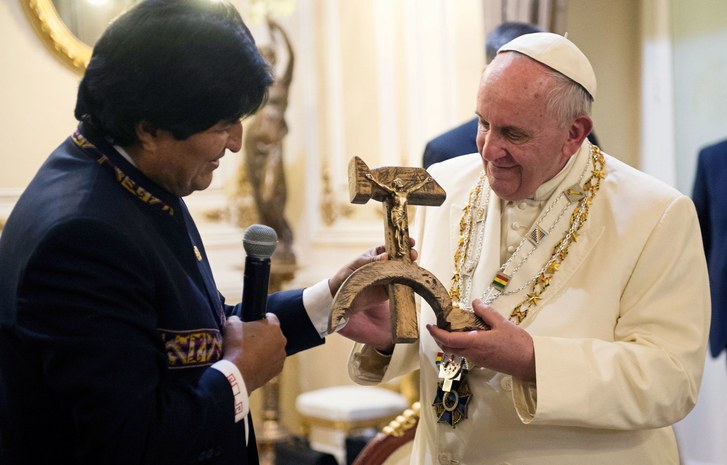The Synod on the Amazon resumes today for its third and final week. Things slowed down over the weekend, so today’s synod report will be brief; we wait to see what will develop as the last days unfold.
The ultimate outcome is not much in doubt, owing to the fact that the main lines were baked into the Working Document. In addition, the people selected to participate are almost exclusively of a certain orientation that’s not only Latin American, but even from the “peripheries” of Latin America. And is making heavy use of a group that, it seems, is supposed to trump all other considerations: “indigenous peoples.”
With all due respect to such persons, many of whom are sincere in their faith and – from my personal experience over the past two weeks – manifest a real desire to think about new ways to preach the Gospel more effectively, this whole exercise has not exactly inspired confidence in those of us living in the rest of this global reality we call the One, Holy, Catholic, and Apostolic Church.
Almost anyone in Rome these days can see that the problem is even more than the idolatrous and notorious ceremonies, or the vaguely cultural-Marxist perspectives on economics and the environment. There’s also what seems a reckless and – to be frank – often aimless belief that the kinds of solutions typical of the Catholic Left in the developed world can become a model of “integral human ecology” for the whole Church.
Item: I saw a woman this week with a Che Guevara t-shirt in front of the Carmelite church where the pagan artifacts are being prominently displayed during this synod. She’s part of the group promoting the value of indigenous spiritualities and cultures.
You can almost look the other way when a young college student, knowing nothing of Che’s murderous history, or history in general, puts on a t-shirt like that, thinking Che is handsome, and cool, and romantically revolutionary. But for a mature woman, taking part in an event at the Vatican, to wear the image of a monster – a Latin American Lenin or Stalin or Mao – makes those of us who remember the 100 million people killed by Communism see red.
If you follow the conversation of a significant part of the participants at the synod, they still are under the delusion that Marxist and socialist perspectives offer them something brilliant and perceptive about exploitation by capitalists.
I’ve mentioned in this space before, that a Venezuelan bishop complained that 35 companies are operating without proper permits, and doing environmental damage, in his diocese. What he did not say, however, is that this is occurring in a Venezuela, once quite wealthy because of its oil reserves, which under two consecutive socialist rulers now have sent 6 million citizens as refugees into Colombia and Brazil.

Like socialist regimes always and everywhere, socialists claiming to represent the interest of the people have bankrupted a wealthy country and made it difficult for people in a once-rich country even to find basic services and food.
Somehow this obvious fact never seems to find its way into discussions at the Vatican these days. Pope Francis, who castigates Europeans for failure to welcome refugees can say nothing about the refugees fleeing the Bolivarian Revolution in Venezuela. Similarly, he can lambaste Europe for prejudice against Muslims, but dares not say a word publicly about the increased persecution of our fellow Catholics in Communist China, or the revolt in Hong Kong against Chinese threats to freedom, a resistance movement largely driven by Catholics.
In today’s main TCT column, Russell Shaw, an old hand with the U.S. bishops, points out how the various figures nominated for president and vice-president of the USCCB continue along lines created by John Paul II and Benedict XVI: a renewed Catholicism that does not compromise with the quite potent forces in the developed world that are leading to demographic winter and, potentially, the end of the Church in its historic homelands.
A strong majority of our American bishops know what they are dealing with in the most modern, postmodern, post-truth nation on earth. They sense the kind of leadership we need at this moment and are quite willing to go their own way, in confidence, even if Rome would have preferred something quite different.
One of the interesting things that we will see in the next few days – and the next few months – may be a kind of international carom shot. Some people here think that, unlike the feisty countercultural nominations by our American bishops, the proposals for women deacons at the synod are a red herring. That question has been studied multiple times in Rome and always ended with the same answer: there’s no basis in the tradition for them.
So is that proposal just a distraction so that Rome can say: OK, not that, but we’ll only allow married men as priests, something that already exists in small pockets of the Church elsewhere?
But there’s another phase of this whole process that we’ll see before the end of this calendar year. When the Germans go off on what is very likely to be a much more radical departure from tradition, will it give some figures in the Vatican, including the pope, cover to say, well, you see, compared to that, our Amazon gambit is not so very radical?
So it’s worth keeping an eye on what happens this last week in Rome for what it is in itself, but also for a longer game now being played, whose outcome may not be clear for some months.
*Image: On July 8, 2015, Bolivian President Evo Morales presented Pope Francis with a crucifix carved into a wooden hammer and sickle (L’Osservatore Romano/AP)















